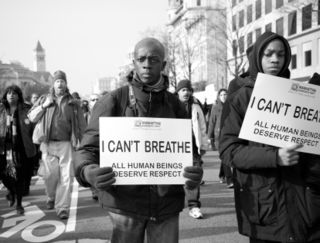Bias
Proactively Coping With Racism
Getting back to our lives in the aftermath of racial violence in the media.
Posted July 19, 2016
by Ryan C.T. DeLapp, MA, and Monnica T. Williams, PhD
Racial Media Violence is Stressful
This month Black America awoke to news of two troubling killings of Black males by-way of police encounters. For most people of color, it becomes increasingly impossible to escape the barrage of news coverage broadcasting the gruesome details of the events that led to the deaths of Alton Sterling and Phinlando Castile. For many, the recurrence of racial tragedies serve as an ever-present reminder of the racial barriers and biases that interpersonally and systemically threaten the lives of African Americans. What’s notable about these reminders of racism is the psychological toll that it takes on its victims both directly and indirectly (e.g., by-way of media coverage). A wealth of empirical evidence demonstrates that experiencing discrimination, especially when chronic, is associated with a myriad of negative physical and mental health outcomes, including anxiety, depression, traumatic reactions, and even psychosis.

However, victims and witnesses of such racial events have shown resilience by implementing a range coping strategies to manage their distress to some degree. Given the repeated exposure to Black lives being lost as a result of police brutality and excessive force, it begs the question of how does Black America cope? Moreover, when chronically faced with societal messages (via repeated news coverage, social media posts, and within interpersonal circles) communicating the meaninglessness and inferiority of Black lives, how does Black America re-enter their normal day-to-day lives and attempt to functionally continue meeting daily demands (which may include close interactions with White America)?
How Do Black Americans Cope with Racial Stress?
A coping response that is grounded in the burgeoning field of positive psychology is proactive coping, which characterizes how individuals detect, interpret, and prepare for anticipated stressors in their daily lives. This coping approach describes how individuals may minimize the onset of stress in advance. Literature (albeit limited) demonstrates that stigmatized groups (including African Americans) utilize proactive coping to ‘effectively’ manage stigma-based stress. Some of our current work at the University of Louisville’s Center for Mental Health Disparities illustrates how African Americans proactively cope with racism, especially when they anticipate that a peer or colleague may behave in a racist manner toward them.
Despite the potential injurious nature of racial discrimination, recent findings (including work from our lab) remind us of the resiliency of stigmatized groups when faced with such stress. Specifically, there are several coping strategies that stigmatized individuals use to empower themselves as proactive agents against anticipated stigma-based stress. Broadly, African Americans used proactive coping to maintain self-control in anticipation of racial discrimination and to manage the situational dynamics of an interracial interaction where one’s peer or colleague may behave in a biased manner. These strategies can include suspending judgments about where one’s peer will be racially aggressive/insensitive until further information is obtained (reserved judgment), reconfiguring one’s perception of their peer to be more positive in nature (cognitive reappraisal), effortful control tactics to avoid impulsive reactions, disclosing personal information to encourage one’s peer to view them as individual rather than as a negative stereotype (individuating information), and pursuing information about the nature of a peer’s racial biases to guide coping efforts throughout the interaction (information seeking). Collectively, the purpose of these strategies is to enable one to persevere through a racially hostile encounter.
Helpful Coping with Racial Stress
However, these proactive coping responses will not prevent all forms of racial mistreatment. Moreover, such strategies may not even assuage the emotional distress experienced from solely anticipating racism. As such, African Americans may (and often do) utilize a toolbox of coping strategies to deal with the lingering effects racial stress, which include seeking social support within one’s community (e.g., familial support), briefly limiting one’s exposure to cues of racism (e.g., signing off social media), utilizing religious or spiritual practices for comfort (e.g., prayer), seeking distraction from cues of racism (e.g., engaging in pleasurable activities), and participating in restful and relaxing activities. Also, in the aftermath of recent deaths, many African Americans nationwide have sought solace, received social support and validation, and pursued systemic change through peaceful activism. Regardless the deployed strategy, adaptively coping with racism is an ongoing, evolving process.
Harmful Coping with Racial Stress
On occasion, the emotional weight of racism can lead African Americans to engage in maladaptive coping, such as remaining in denial, engaging in substance use, aggression, self-blame – even in extreme cases suicide (i.e., Black Lives Matter activist Marshawn McCarrel) and terrorism (i.e., Dallas shooter Micah Xavier Johnson). These responses are harmful and lead to negative, long-term consequences. If engulfed within a pattern of maladaptive coping, African Americans may find that incorporating the aforementioned adaptive strategies into their repertoire may be a better route to mental health and the achievement of personal goals in face of racial adversity. And if unable embrace positive strategies, professional help should be considered.
Importantly, our focus on coping does not suggest that African Americans should quietly endure racial injustice and mistreatment. Instead, we feel that the effectiveness of adaptive, positive coping responses communicates a more complete narrative of how African Americans manage the daily impact of racism; a narrative that emerges beyond this population being casted as undeserving victims who are powerless against the threat of racism, but a story that illustrates efforts to positively fight back against racial adversity and limit the interference of such stress within their daily lives.
Choosing Positive Coping
This month many African Americans were confronted with this struggle and were tasked with the responsibility of juggling an awareness of our nation’s hostile racial climate with having to re-enter environments where the threat of racism may be easily cued. Coping with racism is can be a difficult task, especially when many today deny the role of racism in the lives of ethnic and racial minorities. As we move through these difficult experiences, it will be incumbent on each of us to make choices that reflect positive coping strategies that move us forward and help us to recharge and reconnect.
Monnica T. Williams, Ph.D., is the director for the Center for Mental Health Disparities at the University of Louisville, and an associate professor in the Department of Psychological & Brain Sciences. She conducts research on race, ethnicity, and psychopathology. Follow her on Twitter (@drmonnica) or visit her clinical practice on Facebook.
Ryan C.T. DeLapp, M.A., is a 5th year doctoral candidate in the clinical psychology program at the University of Louisville. He is currently completing his internship at Albert Einstein College/Montefiore Medical Center Bronx, NY in Child & Adolescent Psychology.
In the Media: Recommended Links
- How to not feel helpless following a week of traumatic violence. (Mashable)
- How do I teach my son to stay alive?: The collective trauma after violence. (Washington Post)
- Watching Videos of Police Brutality Can Traumatize You, Especially If You’re Black. (Huffington Post)
- The Collective Trauma of Watching the End of Black Lives. (TakePart)
- #racialtraumaisreal - Racism Recovery Plan Steps (ISPRC)




